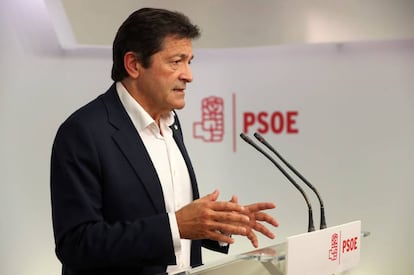Congress rushes to change election date in case no governing deal is struck
Deeply divided Socialist Party has to quickly decide whether it lets acting PM form a government

While the Spanish Socialist Party (PSOE) agonizes over whether to let acting Prime Minister Mariano Rajoy form a new government, Congress is already moving to change the date of the general election that would result from its own inability to choose a leader.
Rajoy’s Popular Party (PP) on Monday proposed changing the election date from the highly unpopular December 25, which the political calendar currently mandates, to December 18.
I am not even considering the possibility of free votes
Javier Fernández, chair of PSOE management team
This date switch requires a reform to voting legislation, and all parties have agreed to put the proposal through ultra-fast-track procedure to ensure that it reaches the Senate for final passage by late October.
If no governing agreement is reached by October 31, King Felipe VI will be forced to dissolve parliament and call new elections. They would be the third in a year, and pollsters are predicting a historically low turnout as Spaniards grow increasingly weary of politicians’ inability to strike deals.
To abstain or not to abstain?
Between now and then, the main opposition PSOE also has to pull itself together following last weekend’s debacle, when Pedro Sánchez resigned as secretary general after an internal rebellion that climaxed with an emergency meeting at Madrid headquarters and protests outside the building.

Sánchez has been an unwavering opponent of supporting a new Rajoy administration in any way, while some Socialist officials feel that the party should allow it in order to pull Spain out of the prolonged political deadlock.
But few within the party have actually come out and said it in so many words. On Monday, Javier Fernández, the chair of the management team that is temporarily leading the PSOE until a new secretary general is found, said the closest thing: “I do not want elections, and I will defend that before the Federal Committee.”
Whatever the decision, all Socialist deputies must vote the same way, as conscience voting is not an option
Until now, high-level party meetings have deliberately avoided the issue. But José María Barreda, a former premier of Castilla-La Mancha, says that Socialists cannot put it off any more, and that anyone who supports abstaining at the investiture vote – a move that would effectively let Rajoy become the new PM – must come out and say so.
“Supporters of abstention have been embarrassed about discussing it,” said Barreda on Onda Cero radio station.
It will be up to the 290-member Federal Committee – the same one that voted Sánchez down on Saturday – to decide whether the PSOE takes the historical step of helping its traditional rival into office.
Before that, Javier Fernández will convene a session of the Territorial Council, in which top regional leaders will decide on a common position and convey it to their grassroots. If this council greenlights abstention, it will not have an easy job of convincing the rest of the party, where Sánchez’s no-to-Rajoy attitude has made great inroads.
Whatever the decision, all 85 Socialist deputies in Congress must vote the same way, as conscience voting is not an option.
“I am not even considering the possibility of free votes,” said management team chair Fernández, who is also the regional premier of Asturias. Instead, he will attempt to convince fellow party members that “abstaining is not the same as supporting.”
English version by Susana Urra.
Tu suscripción se está usando en otro dispositivo
¿Quieres añadir otro usuario a tu suscripción?
Si continúas leyendo en este dispositivo, no se podrá leer en el otro.
FlechaTu suscripción se está usando en otro dispositivo y solo puedes acceder a EL PAÍS desde un dispositivo a la vez.
Si quieres compartir tu cuenta, cambia tu suscripción a la modalidad Premium, así podrás añadir otro usuario. Cada uno accederá con su propia cuenta de email, lo que os permitirá personalizar vuestra experiencia en EL PAÍS.
¿Tienes una suscripción de empresa? Accede aquí para contratar más cuentas.
En el caso de no saber quién está usando tu cuenta, te recomendamos cambiar tu contraseña aquí.
Si decides continuar compartiendo tu cuenta, este mensaje se mostrará en tu dispositivo y en el de la otra persona que está usando tu cuenta de forma indefinida, afectando a tu experiencia de lectura. Puedes consultar aquí los términos y condiciones de la suscripción digital.








































